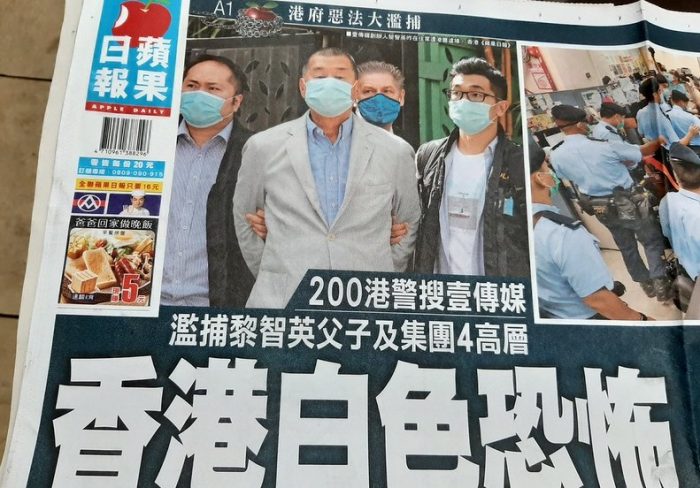
When more than 200 police officers raided the headquarters of Hong Kong’s biggest — and only — pro-democracy mass-circulation newspaper, Apple Daily, on August 10, many people feared this spelled the end of press freedom in the territory.
Earlier that day, they had arrested the paper’s owner, 72-year-old tycoon Jimmy Lai, under a controversial new National Security Law (NSL) for allegedly colluding with foreign forces. He has since been released on bail.
For Apple Daily reporter Patrick*, the symbolism was clear: “[It was] the state apparatus using a paramilitary force to intrude upon a media organization that holds a critical stance. Officers were searching journalistic material. It’s a clear message, this will happen to you if you’re disobedient.”
Freedom of the press is enshrined in Hong Kong’s Basic Law but has suffered in recent years from political and economic pressure and resultant creeping self-censorship, which is reflected in the territory’s poor recent performance in press freedom indices. Yet Hong Kong’s media is still relatively independent and robust — especially compared with mainland China.
The NSL, drafted and approved in Beijing, threatens to change that. It introduces sweeping but vague charges of subversion, secession, collusion with foreign forces and terrorism. Incitement of hatred against the national and local governments is also outlawed.
I spoke with several local reporters working in TV, radio, newspapers and online media to find out what it’s like on the ground, one and a half months after the NSL was passed. All but one, including Patrick, quoted above, requested that I use an alias when quoting them for fear of reprisals.
Many local journalists report increased self-censorship. Patrick says mainstream media organizations now tend to quote already public comments of pro-independence figures rather than interview them directly, and that journalists are losing the “freedom from fear.”
After an interview, I do think about the risk…it’s just a fleeting moment of hesitation, but that moment is a kind of self-censorship.
Selene, a television reporter, says that when interviewing pro-independence figures she and other journalists now avoid discussing advocacy for international sanctions. Journalists worry about showing shots of protest banners with the popular slogan “Liberate Hong Kong,” which the government says violates the NSL.
James, a reporter at I-Cable, is worried that reports deemed critical of the police could result in charges of incitement of hatred against the authorities:
The red lines are expanding quickly to include anything the regime disagrees with … it’s very hard to practice journalism in such an oppressive space.
Although the government has said the NSL will only target a minority of people, it has already had a chilling effect on freedom of expression, according to the journalists I spoke with. Newspaper reporter Kristy says interviewees have become reluctant to speak on the record, or at all, while journalists are afraid they’ll be forced to divulge their sources.
Alvin Lum, who covers local politics for the independent online outlet CitizenNews (and was happy for me to use his name) says the NSL is a “game-changer.” It requires journalists to hand over “journalistic materials” and the law is unclear whether reporting certain views could be seen as advocacy.
A number of other recent incidents have shaken confidence in press freedom. One is a series of attacks on the government-funded public broadcaster RTHK, including government criticism of a journalist who asked a World Health Organization official a question about Taiwan. The government has since ordered a far-reaching six-month review of RTHK.
Another concern is recent changes in management at NOW TV and I-Cable, both until now well regarded as relatively independent news operations. The new managers are either regarded as pro-Beijing, or are less qualified than those they replaced. Meanwhile there have been press reports that the government has set up a new national security unit to vet visas for foreign journalists.
Given the uncertainties created by the NSL, and escalating tensions between Beijing and Washington — in which journalist visas have become tools of retaliation — foreign media organizations may be tempted to follow The New York Times, which recently relocated part of its Hong Kong-based operations to Seoul.
Apple Daily reporter Patrick says: “I hope the international media don’t leave Hong Kong so easily, or station fewer journalists here. Having more media reporting in Hong Kong will help to protect Hong Kong’s press freedom.”
There is a tendency when describing developments in Hong Kong to resort to hyperbole — it’s always the “darkest day,” or the “coldest winter” for Hong Kong’s autonomy, freedoms, or rule of law.
The gradual undermining of values, safeguards and institutions that underpin Hong Kong in recent years — and especially since the 2019 protests — reveals the inadequacy of such language. There is a common saying about this decline that “there is no most, only more” — meaning things can be expected to worsen.
Hong Kong’s media will face more challenges ahead. Its journalists are nervous and fearful — and some are seriously considering their future in journalism. One of the frontline journalists I spoke to described press freedom as being “seriously ill” and another said it was “close to death.”
But they aren’t ready to give up. “We’ll take one step at a time. [Press freedom] isn’t dead, there are a lot of reporters working hard!” Selene told me.
She pointed out that Apple Daily was still publishing – it printed hundreds of thousands of extra copies after the raid. Citizens eagerly snapped up copies and bought shares in the paper’s parent company Next Digital.
As Raymond, a 15-year industry veteran, says: “Everyone — the public, reporters, editors, interviewees — is a part of this struggle for press freedom. It’s alive as long as people are willing to keep it alive.”
*Most journalists’ identities have been disguised in this article.
Yuen Chan is a senior lecturer in the department of journalism at City, University of London. This article is republished from The Conversation under a Creative Commons license.![]()